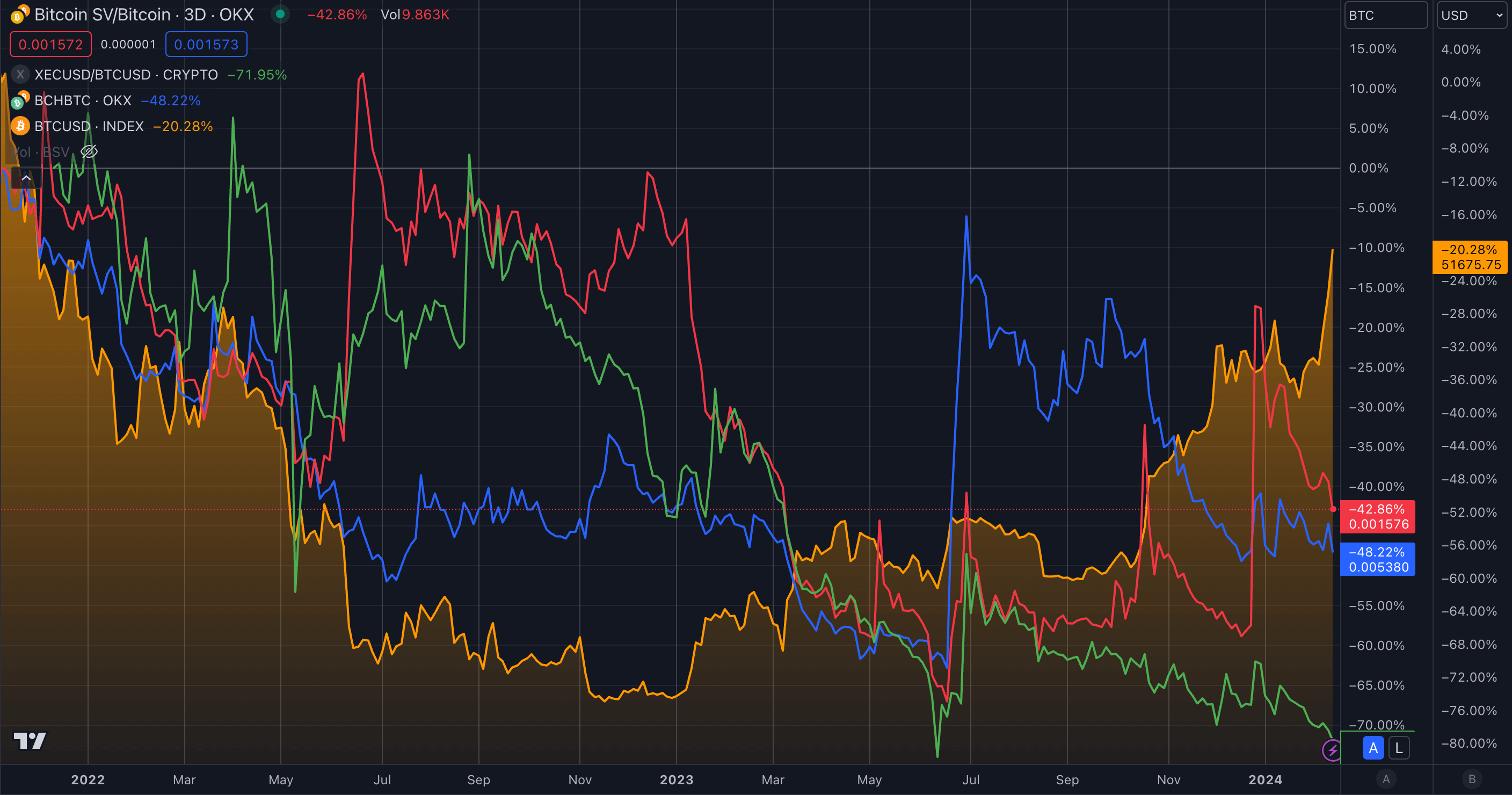Major Bitcoin forks, including Bitcoin Cash (BCH), Bitcoin SV (BSV), and eCash (XEC, formerly Bitcoin Cash ABC), have experienced significant price depreciation against Bitcoin (BTC) since its all-time high in November 2021. BCH declined by 48%, BSV by 42%, and XEC suffered a substantial 71% loss against BTC during this timeframe.

This bearish performance contrasts with Bitcoin’s trajectory, which has displayed relative resilience, down only 20% in dollar terms after it rallied alongside the Newborn Nine’s initial application and eventual approval of spot Bitcoin ETFs.
The three main Bitcoin forks have a relatively low beta to BTC, showcasing a negative correlation in price action. While Bitcoin declined from November 2021 until January 2023, the forks saw some positive performance in the latter half of 2022. However, as Bitcoin began to recover from January 2023, the forks then started to retreat.
This trend continued until June 2023, when all three forks rose significantly against Bitcoin, with BCH recovering around 65%. BSV and XEC also regained approximately 30% and 20%, respectively, while Bitcoin increased roughly 8% against the dollar in that period as BlackRock entered to spot Bitcoin ETF race.
BSV’s price surge of 65% can be linked to a significant increase in trading volume on Upbit, South Korea’s largest crypto exchange, where the majority of BSV’s trading volume was concentrated. BCH’s price jump to a one-year high was fueled by a combination of factors, including its inclusion on EDX Markets, rising trading volumes, and a spike in social media interest. The XEC mainnet also had several updates throughout 2023, aligning with its price performance.
However, likely, BlackRock throwing its hat in the ring for a spot Bitcoin ETF on June 15 was a relevant factor in the forks’ surge. Social media speculation that Bitcoin becoming an institutional investment product could have a positive effect on forks may have fueled initial momentum trading activity. Yet, ETF sponsors like BlackRock, Fidelity, Ark Invest, and others released prospectus updates, identifying that they would not support any future or past forks in their offerings. Thus, after the initial surge against Bitcoin, all three forks retraced most of their gains.
BSV had a momentary solo rally in November ahead of the COPA vs. Wright trial on the identity of Satoshi Nakamoto, gaining around 40% against BTC. The rally was short-lived as it then continued on its downward trajectory as evidence was released ahead of the court trial starting in February 2024.
While broader market forces impact the entire crypto sector, Bitcoin’s strengthening narrative and institutional interest appear to have further amplified losses for BCH, BSV, and XEC. Additionally, controversies surrounding figures such as Craig Wright, who claims to be the pseudonymous Bitcoin creator Satoshi Nakamoto, may contribute to BSV’s declining price performance.
The disparity highlights the potentially waning market dominance of major Bitcoin forks as investors re-evaluate these projects amid a competitive landscape where Bitcoin continues to solidify its narrative as the premier digital asset.
Bitcoin Market Data
At the time of press 3:41 pm UTC on Feb. 14, 2024, Bitcoin is ranked #1 by market cap and the price is up 6.24% over the past 24 hours. Bitcoin has a market capitalization of $1.02 trillion with a 24-hour trading volume of $39.56 billion. Learn more about Bitcoin ›
Crypto Market Summary
At the time of press 3:41 pm UTC on Feb. 14, 2024, the total crypto market is valued at at $1.93 trillion with a 24-hour volume of $84.08 billion. Bitcoin dominance is currently at 52.73%. Learn more about the crypto market ›

